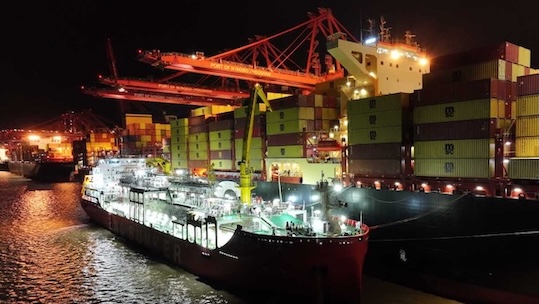Ningbo pioneers carbon trading for construction waste
Ningbo, Zhejiang province, has broken new ground in tackling the low-resource utilization of construction waste by launching China's first carbon reduction transaction for recycled building materials.
On Dec 26, the city hosted the country's first-ever certification release and carbon reduction trading event for waste-free low-carbon products, including recycled aggregates and bricks.
Lu Yashuang, a project leader at China Beijing Green Exchange, said that this marks China's first-ever instance of building waste being fully utilized for both recycling and carbon reduction trading.
Ningbo generates over 1 billion metric tons of construction waste annually, with nearly 90 percent of urban solid waste consisting of construction debris. However, market demand for recycled products is low, leading to a recycling rate of less than 10 percent. As a result, recycling companies have been hesitant to engage, given the limited market for such products.
"This is a national challenge," said Tang Wenbiao, head of Ningbo's "Waste-Free City" initiative, "It is crucial to explore more appropriate market mechanisms to address this issue."
At the event held on Dec 26, Ningbo Supply and Recycling Technology Co Ltd sold 100 tons of carbon credits generated by processing construction waste into recycled products. Deli Group purchased the credits to produce "zero-carbon pens", while the Ningbo Branch of China Pacific Insurance Co Ltd plans to incorporate them into innovative carbon-related insurance products.
According to the newly released certification standards for low-carbon recycled bricks and aggregates, Ningbo Supply and Recycling Technology reduced solid waste by 10,238 tons by producing recycled bricks during the reporting period. This resulted in 3,678 tons of tradable carbon credits, valued at over 100,000 yuan ($13,702) on the market.
Wang Jinghang, vice chairman of Ningbo Supply and Recycling Technology, explained that through carbon trading, companies can generate additional revenue from recycled products, motivating them to engage in further recycling efforts. The company worked with China Beijing Green Exchange and China Environmental United Certification Center to certify the carbon reductions, which were then traded on the Ningbo Property Rights Exchange's carbon platform.
"This is a groundbreaking move that could inspire other cities to adopt similar strategies," said Peng Yingdeng, chief engineer at the National Center for Urban Environmental Pollution Control Technology.

 A look at China's economic data in November
A look at China's economic data in November  240-hour visa-free travel in Zhejiang, city or not city?
240-hour visa-free travel in Zhejiang, city or not city?  Global visitors get immersed in Ningbo's maritime and cultural riches
Global visitors get immersed in Ningbo's maritime and cultural riches 


